Fever Pitch (1985)
 There are few films that could legitimately be called unique, but Richard Brooks’ loony final film, Fever Pitch, has no problem earning that distinction.
There are few films that could legitimately be called unique, but Richard Brooks’ loony final film, Fever Pitch, has no problem earning that distinction.
Often, when a once heralded filmmaker begins to lose his way, he either drifts off into obscurity (Richard Lester) or boredom (J. Lee Thompson), paying about half as much attention as he would have in his prime and simply piling on exploitable elements to make sure the film turns a profit so he can guarantee his pension. However, filmmakers like Brooks and Robert Aldrich, both of whom had started making these movies for their own production companies, simply ignored their dwindling clarity and kept on pushing to produce some of the worst/best American films of the 70s and 80s. Aldrich went out with unfathomable dreck such as The Choirboys and …All the Marbles, engaging in his basest instincts of misogyny, homophobia, racism, horrendous writing, and unmoderated acting, all without any direction or consistent tone. Of course, as inadvertent entertainment, this puts them near the top of the list.
 Brooks (Elmer Gantry, Blackboard Jungle, In Cold Blood, Cat on a Hot Tin Roof), on the other hand, took his delusions seriously, and attempted one polemic after another, unaware of his now-quaint, old fashion values, with such delirious moral commentaries as Looking for Mr. Goodbar and the prescient, but incompetent Wrong is Right (starring Sean Connery’s toupee).
Brooks (Elmer Gantry, Blackboard Jungle, In Cold Blood, Cat on a Hot Tin Roof), on the other hand, took his delusions seriously, and attempted one polemic after another, unaware of his now-quaint, old fashion values, with such delirious moral commentaries as Looking for Mr. Goodbar and the prescient, but incompetent Wrong is Right (starring Sean Connery’s toupee).
Fever Pitch goes off the tracks as well, to a mammoth degree, in dealing with gambling, it somehow combines the naiveté of Reefer Madness, with a non-stop endorsement of and ad for MGM casinos (who financed the film), topped off with cautionary and didactic speeches obviously derived from some Gamblers Anonymous manual. There’s even the hooker with a heart of gold (played by the mom from 7th Heaven), hard boiled violent flashbacks of a life lost, and soft-focus sequences of a father and daughter at an amusement park, before her innocence is corrupted. And it all ends with Ryan O’Neal covered in mustard.
 It is hard to guess what Brooks was really attempting; obviously the initial idea was to give us a way in by having his lead, O’Neal, be a reporter doing an expose on the details of gambling, but gets bogged down in a mix of 1950s clichés (O’Neal has a terrible gambling problem and he’s continuously battling with his bookie, overmuscled former TV tough guy Chad Everett, a subplot about O’Neal trying to take care of his daughter is equally facile) and the freedom of an 1980s ratings board (cartoonish, unconvincing violence, awkward nudity from the soon-to-be-wholesome whore, a trendy and inappropriate Thomas Dolby score). And while one can laugh at the details, O’Neal must have the largest expense account ever for any newspaper, let alone the fact that he’s a really terrible writer, more bewildering are Brooks other plot and casting choices, John Saxon as O’Neal’s boss and editor, Giancarlo Giannini as a professional gambler and O’Neal’s Deus Ex Machina, and the entire conclusion, which may as well have had a commercial jingle attached to it.
It is hard to guess what Brooks was really attempting; obviously the initial idea was to give us a way in by having his lead, O’Neal, be a reporter doing an expose on the details of gambling, but gets bogged down in a mix of 1950s clichés (O’Neal has a terrible gambling problem and he’s continuously battling with his bookie, overmuscled former TV tough guy Chad Everett, a subplot about O’Neal trying to take care of his daughter is equally facile) and the freedom of an 1980s ratings board (cartoonish, unconvincing violence, awkward nudity from the soon-to-be-wholesome whore, a trendy and inappropriate Thomas Dolby score). And while one can laugh at the details, O’Neal must have the largest expense account ever for any newspaper, let alone the fact that he’s a really terrible writer, more bewildering are Brooks other plot and casting choices, John Saxon as O’Neal’s boss and editor, Giancarlo Giannini as a professional gambler and O’Neal’s Deus Ex Machina, and the entire conclusion, which may as well have had a commercial jingle attached to it.
The whole film falls into that category of Pauline Kael’s description of how they could have cut down Heaven’s Gate to a manageable length; she could see what needed to be trimmed, just not what deserved to be left in. Brooks has 3 or 4 terrible movies going at once, crammed into 95 minutes and tied together with voiceover. I’m sure he thought the whole thing could be saved in the editing room but common sense had abandoned him long ago. What is quite clear is, Brooks really means everything on screen, and we’re all fools if we ignore him. The strangest thing in the whole film is how deadly sincere it is.
One thing is for sure, the movie is an absolute must-see, only a real talent can make the truly terrible atrocities without hedging his bets and losing his nerve.



